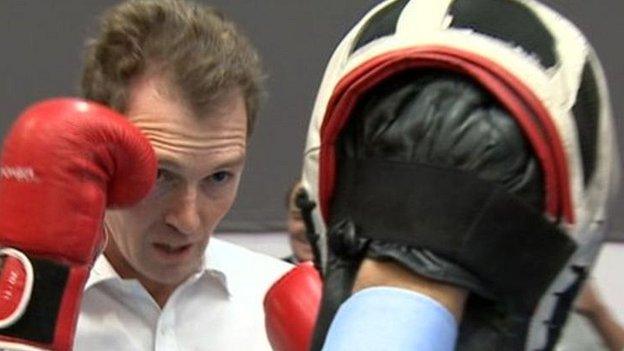Welsh Questions: blue-on-blue clash over EU referendum
- Published
- comments

Up for the fight: Monmouth Tory MP David Davies challenged Welsh Secretary Alun Cairns over the EU referendum.
The last Welsh question time in the House of Commons before the EU referendum saw some of the blue-on-blue action the prime minister has been so keen to avoid.
Monmouth MP and "leave" campaigner David Davies raised the issue with Welsh Secretary Alun Cairns: "You will surely have seen the report from Cardiff University yesterday, external showing that Britain pays nearly £10 billion net to be part of the European Union. If we took that money, under the Barnett formula do you agree that that money could leave Wales half a billion pounds a year better off if we vote "leave" on June 23?"
Mr Cairns told him: "You are failing to recognise the impact of all of the independent forecasters, be they the IMF, the OECD, the governor of the Bank of England that talks about the negative impact 'Brexit' would have on the Welsh economy £2 billion reduction in the scale of the economy, costing 24,000 jobs. That's a step we cannot afford to take."
Mr Cairns's predecessor-but-one David Jones asked if Wales Office special advisers had met the Britain Stronger in Europe, external campaign and, if so, what did they discuss.
The answer was along the lines of "a range of issues" that affected the Welsh economy including "Brexit". Mr Cairns repeated his figures from the Treasury analysis published on Monday. (You can read the official guidance for civil servants and special advisers here, external.)
The EU debate has made some unusual allies. Mr Cairns's deputy, Guto Bebb, found himself agreeing with Labour's Shadow Welsh Secretary, Nia Griffith.
'Consensual'
And Plaid Cymru's parliamentary leader, Hywel Williams, Plaid Cymru's Westminster leader, asked Mr Cairns this question:
"Steel was a significant element in Wales's £5 billion of exports to the EU in 2015. That is, in fact, a third of the whole of the Welsh Government's total budget.
"Will you now make the positive case for the advantages to Wales's businesses, to jobs and profitability of remaining within the European single market and the European Union?"
Mr Cairns told him: "You are absolutely right - 69% of steel produced in the UK is exported to the European Union. Access to that single European market is fundamental for the steel industry but it is also fundamental to attracting a buyer."
It was that sort of cross-party consensual question time: it might be rather different next time.